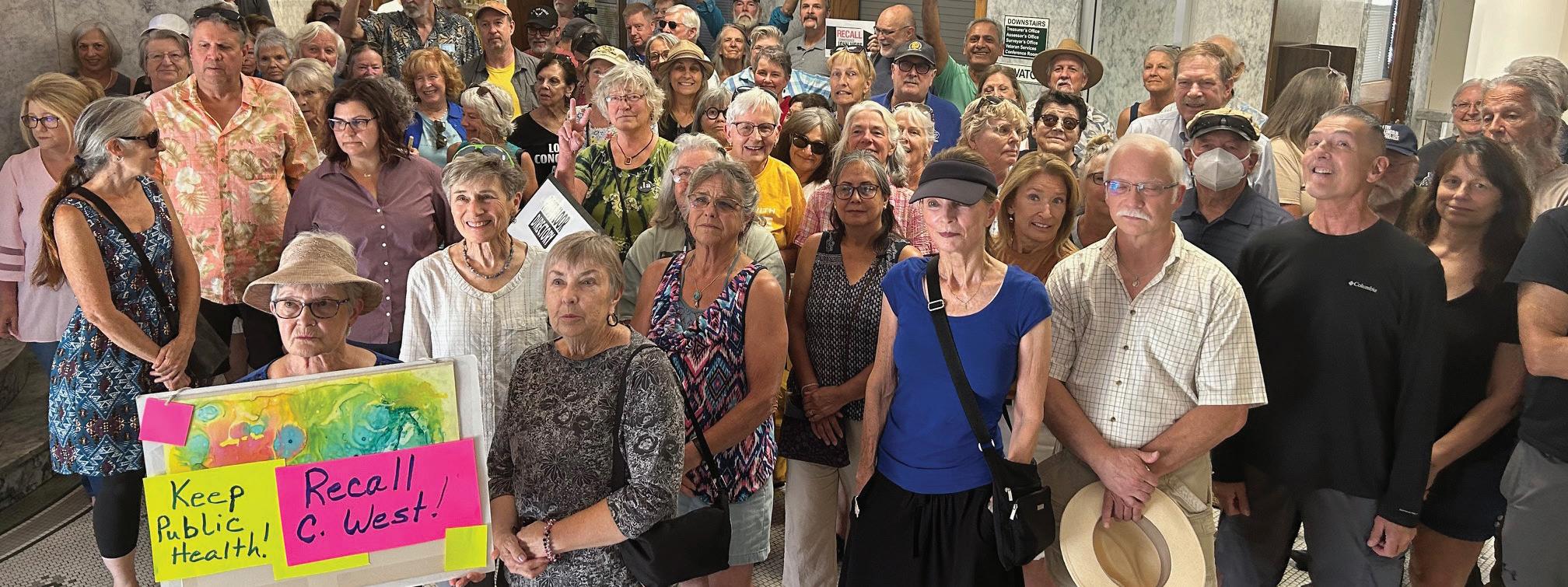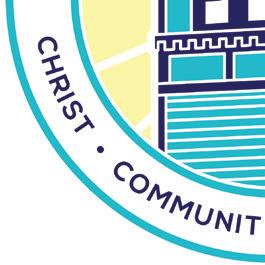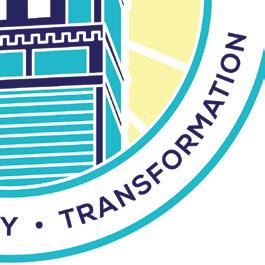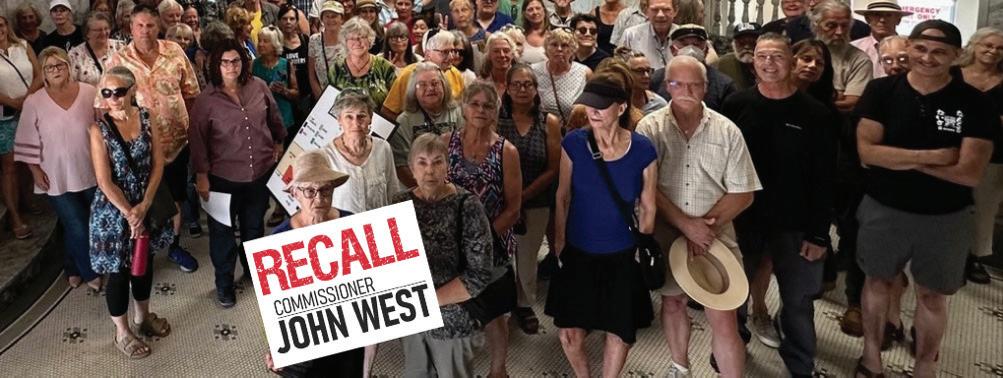SeniorPlanner
YOUR RETIREMENT GUIDE TO YOUTHFUL LIVING
OCTOBER 2024
A County in Crisis
The Recall of John West
By: John Oliver
JOSEPHINE COUNTY finds itself at a crossroads, as an effort to recall County Commissioner John West gains traction. The movement to remove him from office is driven by a wide range of grievances, from financial mismanagement to divisive public behavior, and has united people from across the political spectrum. What began as a Republican-led initiative now includes support from diverse political and social backgrounds, all seeking to restore trust in local government.
The push to recall Commissioner West officially began on August 2, 2024, when the Committee to Recall John West, headed by petitioner Lily Morgan, filed the petition. The campaign did not arise overnight; it represents the culmination of over 18 months of frustration with West’s conduct and decisions. Accusations of cronyism, illegal behavior, and disregard for the voters’ will have left many convinced that his leadership has caused irreparable harm to the county. The petition cites a series of issues, including questionable property sales, budget cuts to essential services, and financial losses totaling more than $6.4 million — losses that an economically struggling county can ill afford.
One key issue fueling the recall is the failed sale of the Pipe Fork property, a deal that had been in negotiations for years. Commissioner West’s last-minute vote against the agreement led to a $2.3
million loss in revenue, as well as missed opportunities for future timber-related income. This decision was widely seen as politically motivated, particularly since the land was set to be sold to a local community group that had long fundraised for the purchase. Adding to the controversy are questions surrounding West’s ownership of an adjacent property, which he claims to have sold, despite public records suggesting otherwise.
Another contentious action was his decision to cut funding for the Oregon State University Extension Service and 4-H programs. These cuts resulted in an $852,000 loss and contradicted the will of the voters, who had supported these programs for their significant contributions to the local agricultural community. Beyond the immediate financial damage, this move weakened vital community services, leaving many residents feeling betrayed and further eroding trust in county leadership.
The recall petition also accuses West of budget cuts to public health and law enforcement services, compromising public safety and reducing emergency services like the Firewise program. His administration has faced additional scrutiny for alleged unlawful withdrawals from the Library District, which have led to costly legal disputes and ongoing ethics violations.
Continued on page 7


Making Your Voice Heard
Senior Citizens Voting in the Election
By: Ellen Ward
AS THE ELECTION APPROACHES, senior citizens play a crucial role in shaping the future of the country. With higher voter turnout rates compared to other age groups, seniors have consistently demonstrated the power of their collective voice. However, barriers to voting, such as mobility challenges or health concerns, can pose obstacles for some elderly individuals. Fortunately, there are multiple options available to help ensure that seniors can participate in this year’s elections and make their votes count.
Mail-In Ballots: A Convenient Option
For those who may find it difficult to leave their homes, mail-in ballots offer a practical alternative to in-person voting. Voting by mail allows seniors to fill out their ballots at home and submit them by mail without the need to visit a polling place. Many older adults have already registered for mailin voting, but for those who haven’t, it is essential to check the registration deadlines in your state. In many areas, the deadline
Continued on page 3
























Listeria Alert: Understanding the Risks and Staying Safe Amidst Recent Recalls
By: Charles Power
RECENT FOOD RECALLS have brought listeria back into the spotlight, raising concerns about food safety. Multiple products, including hamburger patties, frozen vegetables, and ready-to-eat meals, have been pulled from shelves, prompting questions about why listeria is a recurring issue and how consumers can stay safe.
Listeria is a resilient bacterium commonly found in soil, water, and animals. It can thrive even in refrigeration, making it difficult to control in foods stored cold. When ingested, listeria can cause listeriosis, a potentially serious illness. Symptoms range from mild (fever, muscle aches) to severe (meningitis, sepsis), particularly affecting pregnant women, the elderly, and those with weakened immune systems.

In 2024, the U.S. experienced a surge in listeria-related recalls, partly due to enhanced detection technology, which has improved the identification of contamination. The expansion of large-scale
food processing and distribution networks has also increased the risk, as a single contaminated batch can reach a vast number of consumers. Additionally, environmental factors like warmer temperatures may be contributing to the spread of listeria in agricultural products.
To protect yourself, stay updated on food recalls by checking the U.S. Food and Drug Administration (FDA) or the U.S. Department of Agriculture (USDA) websites. Practice good food hygiene by washing hands and utensils thoroughly, refrigerating foods below 40°F, and cooking foods to the appropriate temperatures. Vulnerable individuals should avoid high-risk items such as unpasteurized dairy, deli meats, and smoked seafood.
While the frequency of recalls may be unsettling, it reflects improved safety monitoring. By taking precautions and staying informed, consumers can reduce their risk of listeriosis while authorities work to enhance food safety standards.
Senior Citizens Voting in the
From page 1
for requesting a mail-in ballot has passed or is approaching rapidly. Ensuring that all paperwork is completed on time is key to making this option viable.
Rideshare Programs and Assistance for Seniors
If mail-in voting is not an option, there are still resources available to help seniors get to the polls. Many communities offer rideshare programs specifically designed to transport elderly voters to and from polling places. Some organizations, such as local senior centers or volunteer groups, provide free or low-cost rides to polling locations on Election Day. Additionally, services like Uber and Lyft often run special programs to offer discounted or even free rides for voters.
Friends and family members can also play a significant role in assisting seniors with transportation. Offering a ride to a polling place can be a simple but powerful way to help an elderly loved one exercise their right to vote.
Overcoming Accessibility Barriers
Polling places are required by law to be accessible to all voters, including those with disabilities. For seniors with mobility or health challenges, it’s worth contacting the local election office to inquire about accessible voting options. These may include curbside voting, where election staff bring the ballot to the voter’s vehicle, or designated accessible voting machines inside polling places.
Election
The Importance of Casting Your Vote
Voting is not just a right; it is a responsibility, especially in times of economic, social, and political change. Seniors have a unique perspective and often face different challenges than younger generations, such as healthcare, Social Security, and senior services. Casting a ballot ensures that their voices are heard on these important issues, shaping policies that directly impact their lives and communities.
In this year’s elections, senior citizens have the opportunity to influence decisions on the local, state, and national levels. Whether through mail-in ballots, rideshare programs, or in-person voting, there are multiple avenues to participate. Every vote matters, and making the effort to cast a ballot helps protect and preserve democratic values for future generations.
Preparing for Election Day
To ensure a smooth voting experience, seniors should make sure they have the necessary identification and understand the local voting requirements. It is also wise to review the ballot beforehand, if possible, to be familiar with the candidates and measures.
By planning ahead and taking advantage of available resources, senior citizens can overcome obstacles to voting and continue to have a meaningful impact on the future of their communities and the country.
COLENE MARTIN FOR
Josephine County t Commissioner Position # 2
MY BACKGROUND
27 YEARS BUSINESS
OWNER OF PHOTO DEN
CURRENTLY AT JOHN L SCOTT
12 YEARS OF WORKING WITH CHAMBERS OF COMMERCE AND BUSINESS
30+ YEARS OF VOLUNTEER ACTIVE BOARD LEADERSHIP
My priority is pragmatic problem-solving, and good governance.
I have proven leadership with decades of successes at the state and local levels.
I am asking for your vote in Novemeber.
Colene Martin
1






Firearm Ownership for Senior Citizens
What to Do When It’s Time for Assisted Living
By: Jason Foley
AS SENIOR CITIZENS prepare for life transitions such as moving into a nursing home, a common but often overlooked concern is what to do with legally owned firearms. This article explores various options for handling firearms as a senior citizen, including transferring ownership to family members, preparing for the eventuality of death, and understanding the legal considerations for selling or disposing of firearms.
Planning Ahead: Transferring Firearms to Family Members
MY POSITIONS ON CURRENT ISSUES
BUDGET & FINANCE
Transparency and clarity to the citizens, budget committee and the staff is essential Fiscal responsibility, with efficiencies in current budgets I am dedicated to keeping our county sound and affordable for our residents.
ECONOMIC DEVELOPMENT
2
We need to be an innovative and a forward-thinking community, supporting our business community and employees I am looking forward to seeing the Fairgrounds becoming an economic driver to our community Expanding and utilizing our airports, there is an opportunity and need for job training in the flight industry as well as for the hobbyist Maintaining and improving our parks to serve the families and their activities Illinois Valley is growing, and the vibe out there is brilliant, they want to enrich their community & support their neighbors. Supporting our organic and agriculture industry
INSURING OUR COMMUNITIES SAFETY
3 HOUSING/HOMELESS
4
My unwavering commitment to the safety of our community drives my vision. I’ll work tirelessly to fortify law-enforcement staff and resources for our Sheriff and the jail
I will collaborate with existing building programs, nonprofits and healthcare workers to see how we can expand these crucial services in our county We need a comprehensivecommon sense approach while respecting the rights of property owners
For more info Electcolenemartin.com
Paid for Friends of Colene Martin # 23406
One of the most straightforward options for senior citizens is to transfer ownership of firearms to a trusted family member, such as a child, sibling, or grandchild. Here are some steps to ensure a smooth transfer:
Check State Laws: Gun laws vary widely by state, particularly regarding the transfer of firearms. It’s crucial to understand the legal requirements in both the senior’s state of residence and the family member’s state (if different). Some states require background checks or permits for private transfers.
Firearm Registration and Ownership Transfer: In states that mandate firearm registration, the transfer process will involve legally documenting the new owner. This may include filing paperwork with local law enforcement or a state firearms agency.
Gifting Firearms: If gifting firearms is the preferred option, be aware that certain types of firearms, such as automatic weapons or firearms regulated under the National Firearms Act, have additional restrictions. In these cases, consulting a firearms attorney or expert is advisable.
What Happens When Moving into a Nursing Home?
Most nursing homes and assisted living facilities have strict policies prohibiting residents from possessing firearms on the premises. If a senior is moving into such a facility, they will need to make alternative arrangements for their firearms.
Storing Firearms: Consider using a licensed firearms storage facility. These facilities specialize in safely storing weapons and often offer long-term storage solutions.
Loaning Firearms to Trusted Individuals: If there is a trusted individual who is legally eligible to possess firearms, the senior may temporarily loan the firearms to them, provided it complies with local and federal laws.
Consulting the Facility: If the nursing home permits firearms in some form, such as under specific locked storage conditions, inquire about their policies.

However, this is rare, and most facilities will require complete removal of firearms from the premises.
Handling
Firearms After a Parent’s Death
When a senior citizen passes away, family members must navigate the process of legally transferring or disposing of the firearms. Here are some considerations: Inheriting Firearms: Firearms can be inherited through a will or estate plan. It’s beneficial to specify in legal documents who will inherit the firearms to avoid confusion. State laws differ on whether inherited firearms need to be registered, so it’s crucial to understand the local legal requirements.
Executor Responsibilities: If the firearms are part of an estate, the executor is responsible for handling their transfer. The executor should inventory the firearms, determine the legal requirements for transferring them, and ensure compliance with all local and federal laws.
Firearms Not Wanted by Heirs: If the heirs do not wish to keep the firearms, they can sell or donate them. Selling requires a legal transfer through a licensed firearms dealer, who will conduct a background check on the buyer. Donation options include law enforcement buyback programs or donating to museums if the firearms are of historical significance.
Legal Considerations for Selling or Transferring Firearms
When selling firearms, federal law mandates that the transfer go through a licensed firearms dealer (FFL). This ensures
a background check is conducted on the buyer. The process varies depending on the type of firearm, the state’s regulations, and the potential need for additional documentation, such as a bill of sale or firearm license.
Using a Licensed Firearms Dealer (FFL): An FFL can facilitate the legal transfer and sale of firearms, ensuring compliance with state and federal laws. This is often the safest and most reliable way to handle the sale.
Firearms Buyback Programs: Many communities have firearms buyback programs where individuals can sell firearms to local law enforcement. These programs aim to reduce the number of firearms in circulation and may offer monetary compensation.
Donating Firearms: For seniors who wish to dispose of their firearms without selling them, donation to a firearms museum or a historical society is an option, especially if the weapon has historical significance.
The Importance of Legal Guidance
Navigating the legal landscape surrounding firearm ownership and transfers can be complex. Seeking the guidance of a firearms attorney or an expert in estate planning can ensure compliance with laws and provide peace of mind.
Planning ahead for what to do with firearms when transitioning to assisted living or upon death helps protect the senior citizen’s legacy and ensures their firearms are handled responsibly. By taking proactive steps, families can avoid legal issues and ensure the safety and security of everyone involved.











www.grantspassmag.com














The effort to recall County Commissioner John West gains traction
From page 1
The call for West’s recall has intensified following his behavior during an October 10, 2024, rally in downtown Grants Pass. What was intended as a peaceful demonstration outside the County Courthouse quickly escalated into a contentious confrontation. Demonstrators from both major parties were present, rallying for their respective presidential candidates, and tensions soon boiled over.
Witnesses reported that West confronted a woman wearing a “Republican’s for Harris” shirt, using what some described as intimidation tactics. Video evidence showed West towering over the woman while some of his supporters made derogatory remarks, including racial slurs and offensive language targeting LGBTQ+ individuals. The rally’s atmosphere grew increasingly hostile, with participants exchanging personal insults and accusations. The situation took another turn when West’s supporters claimed that the woman had thrown a water bottle at him — a claim refuted by video footage showing the bottle in her possession throughout the encounter.
This incident added to the growing perception that West’s leadership is divisive, with critics accusing him of stoking the county’s political rift rather than fostering unity. The confrontation at the rally is just one example of what some see as a pattern of behavior unbecoming of an elected official, fueling the argument that West lacks the temperament to hold office.
As the recall effort has gained momentum, it has attracted support from a coalition of volunteers, community leaders, and citizens who are concerned about the future of the county. The movement has evolved into a bipartisan initiative, transcending party lines in the pursuit of integrity and transparency in local government. With the County Clerk’s approval of the recall petition, the campaign now aims to gather 6,445 valid signatures from registered voters by October 31, 2024, to trigger a recall election in January 2025. If successful, West would be removed from office, and a temporary replacement would be appointed until a special election could be held.

For many, the recall is not just about removing one commissioner but about restoring faith in local leadership. West’s tenure has been marked by a series of controversies, from financial mismanagement to ethical violations. Allegations of hiring unqualified allies, ignoring public opinion, and violating public meeting laws have only deepened public discontent.
The situation in Josephine County reflects a broader challenge facing many communities across the country, where local politics can significantly impact citizens’ daily lives. For residents, the stakes are high. Two more years under Commissioner West’s leadership could mean further financial setbacks, increased public safety risks, and continued erosion of trust in government institutions.
The recall effort represents a critical moment for the county, as it seeks to navigate an increasingly polarized political landscape. With law enforcement seemingly reluctant to investigate the various allegations against West, some citizens feel that accountability is being sacrificed for political convenience. This perception has fueled frustrations that local leadership is more concerned with protecting its own interests than serving the public good.
As the recall campaign intensifies, Josephine County faces a pivotal choice. Supporters of the recall believe that removing West from office is necessary to reverse the damage done and restore responsible governance. For the Committee to Recall John West, led by Lily Morgan, the effort is about more than just politics; it is about reclaiming the soul of the community and ensuring that the county’s leaders are held accountable for their actions.
Whether the residents of Josephine County will come together to unseat Commissioner West remains to be seen. What is certain, however, is that the recall movement has sparked a crucial conversation about leadership, integrity, and the future of the county. As the campaign moves forward, it stands as a testament to the power of local activism in shaping the course of a community’s history.










“At the Grants Pass Gospel Rescue Mission, we are bound to proclaim Jesus Christ to the homeless and needy of Josephine County in a spirit of care by assisting with clothing, spiritual counseling, education, food, healthcare and shelter. We accomplish all this with an attitude of commitment.”


Understanding the Recall of Commissioner John West

WE ARE A GROUP of concerned residents committed to the recall of Commissioner John West, driven by our deep concern for the well-being of our community. Our mission is to address and correct the leadership and decision-making issues that have negatively impacted the health and safety of our county, led to nancial mismanagement, and resulted in violations of state laws.
WHY WE’RE TAKING ACTION
Our efforts are based on several key concerns:
Pipe Fork Property Sale: We believe that West engaged in bad faith negotiations over the sale of the Pipe Fork property, which not only cost the county valuable revenue but also put a vital water source for the Williams community at risk.
Disregard for Voter Will: West has consistently ignored the will of the voters by cutting essential funding for community programs such as the Oregon State U niversity Extension Service, law enforcement, and public health initiatives. These cuts have strained the very services that our residents depend on.
Legal Violations: There are serious allegations against West, including violations of state laws, campaign nance regulations, and public meeting laws. He is also facing pending ethics and labor law violations, raising signi cant concerns about his adherence to legal and ethical standards.
Library District Withdrawal: West unilaterally approved the county’s withdrawal from a Library District, a decision that has led to costly litigation and strained county resources.
Threats to Community Safety: West’s decisions have jeopardized community safety by reducing or eliminating critical emergency preparedness programs, including scaling back the Firewise program, cutting the Emergency Management program, and removing re safety standards for property development.
Questionable Hiring Practices: We are concerned that West has prioritized political loyalty over merit by appointing unquali ed political allies to key county positions, compromising the effectiveness of our local government.
OUR VISION
We envision a county where leadership is accountable, transparent, and truly representative of the community’s best interests. Our recall effort is a step towards restoring integrity in local governance and ensuring that our county’s future is guided by ethical and responsible decision-making.
HOW YOU CAN GET INVOLVED
As we continue to gather support for this recall, we encourage all community members who share our concerns to join us in this important effort. Together, we can make a difference and ensure that our county is governed by leaders who prioritize the well-being of all residents.
MOVING FORWARD
The recall of Commissioner John West is about more than just addressing past actions; it’s about setting a new standard for leadership in our county. If we can join together and collect enough petition signatures from Josephine County voters, the recall ballot measure will appear on a special election ballot in December 2024. You will see by the facts behind our petition points that Commissioner John West has cost the citizens millions just in his rst 19 months in of ce. If enough of our fellow voters agree, we are justi ed in bringing this special election before voters because Josephine County cannot afford two more years of the extremely costly decision-making of Commissioner John West.




